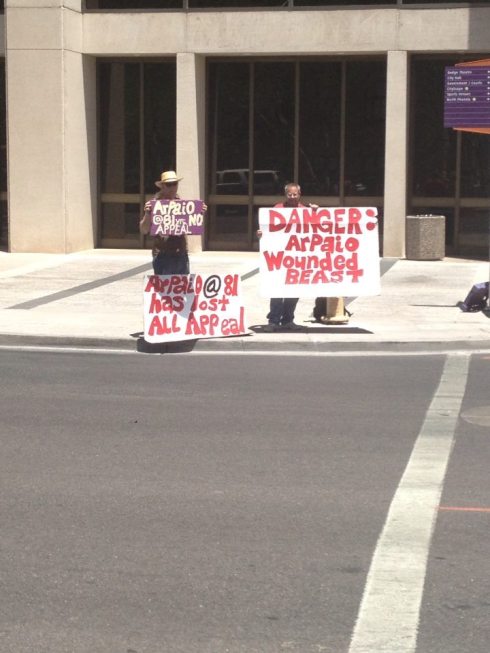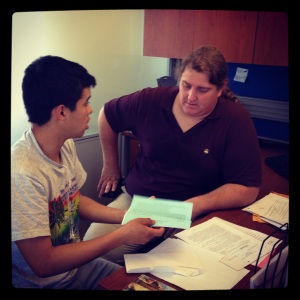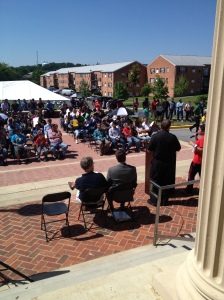
The Supreme Court has found, in a 5-4 decision, that the Defense of Marriage Act is unconstitutional. (Photo credit: Wikipedia)
Ding dong, Section 3 of the Defense of Marriage Act (DOMA), which limited federal recognition of marriage to a man and woman, is dead.
With the stroke of a pen, the U.S. Supreme Court has ended years of discrimination against gay and lesbian couples through its decisions in United States v. Windsor and Hollingsworth v. Perry. With DOMA now ineffective, marriage equality provides more than 1,100 federal benefits previously unavailable to same-sex spouses.
President Obama issued an immediate directive to the Attorney General to “work with other members of my Cabinet to review all relevant federal statutes to ensure this decision, including its implications for Federal benefits and obligations, is implemented swiftly and smoothly.”
The Secretary of Homeland Security, Janet Napolitano also issued a statement to press confirming that DHS is “working with our federal partners, including the Department of Justice, [to] implement today’s decision so that all married couples will be treated equally and fairly in the administration of our immigration laws.”
There are more than 24,000 American same-sex binational couples, but the immigration consequences of the Supreme Court’s decision to strike down DOMA goes beyond simply conferring green-cards to bi-national couples, and even affects step-children, adoption issues, derivative citizenship, and so on.
Some of the benefits that USCIS can promulgate immediately, without the need for new regulations or rule making, include:
- Plain old adjustment of status to green card holder or consular processing and entering as lawful permanent resident;
- Eligibility for provisional waivers for persons who entered without inspection;
- Eligibility for I-601 hardship waivers for persons who were deported or left the country and triggered a 3/10 year bar;
- In the special case of DACA beneficiaries who are queer, if they can obtain advance parole to travel under DACA, in theory, when they re-enter the U.S., they should be able to adjust their status through marriage to a U.S. citizen spouse (assuming no prior deportation);
- Immigration benefits for step-children from a same-sex marriage;
- Availability of waivers based on relationship to U.S. citizen spouse during removal defense including cancellation of removal, 212(h), and so on;
- Relief under the Violence Against Women Act for battered spouses of U.S. citizens;
- Derivative immigrant and non-immigrant visas, for legally-wed spouses including L-2; H-4, most E and EB categories and so on so that foreign-born and/or binational same-sex couples can actually live together in the U.S.;
- Motions to reopen cases with final removal orders, so persons who were previously ineligible for relief can now assert it in court;
- Lawful permanent residency for persons who receiving withholding of removal, who now have U.S. citizen spouses.
That’s just a few examples. However, not everything is fine and dandy in the world, with DOMA gone.
Problems that remain
- Enforcement – USCIS has not yet started issuing green cards for same-sex binational couples, or recognizing them as eligible for other benefits and waivers, but this is just a matter of time;
- As immigration law recognizes a bona-fide marriage based on “place of marriage,” people who are too sick or poor to travel to one of the few states that provide for same-sex marriage lose out. A creative solution would perhaps be to figure out how video-conferencing technology can enable marriage of a couple stuck in an anti-marriage state or country;
- Asylum seekers cannot get follow-to-join benefits for their partners left behind in countries with despicable LGBT human rights records. A creative solution for this may be enabling asylum seekers to gain humanitarian parole for a partner;
- People detained in anti-marriage-equality states would also be left to fend for themselves. While this is true for even straight people, LGBT persons are much more vulnerable in detention;
- Bigoted consular processing officials who reveal the sexual orientation of an applicant to their relatives in the foreign country, thereby putting their lives at jeopardy in their home countries;
- Bigoted case officers in the U.S. – Now LGB couples can enjoy the misery that straight couples go through at marriage-based interviews and perhaps, withstand a lot more scrutiny than their heterosexual counterparts (i.e. answering questions like “Who is the man in the relationship?”);
- Persons who have remained closeted, who come out and claim marriage benefits such as health insurance, may be subject to employment sanctions and workplace discrimination, which remains entirely legal without a trans-inclusive Employment Non-Discrimination Act;
- For decades, LGBT persons have been evading border controls in creative ways. Those ways may come back to bite in some instances, especially where LGB persons have committed marriage fraud by marrying straight persons for papers. There are, of course, several defenses, and one should seriously consider exploring all their options with an immigration lawyer experienced in litigation and removal defense. It is critical to note here that simply marrying to gain an immigration benefit is not fraud — fraud is triggered when papers are filed to get a particular immigration benefit.
I’m sure people have many questions and are seeking more practical knowledge for their individual cases. As such, I’d implore people to join Immigration Equality’s Legal Director Victoria Neilson, and Binational Couples Attorney, Tom Plummer, for a special, 90-minute conference call today at Noon Eastern. Immigration Equality, where I am a Board Member, is the only non-profit organization in the United States that provides direct legal support to LGBT immigrants, and can also refer individuals to immigration lawyers across the country.
To join the call, dial
(800) 868-1837
(404) 920-6440 if you are outside the United States
and use access code 397548#
The IE legal team has posted answers to preliminary questions on their website. You can read those online here.
P.S. In the excitement that ensued from yesterday’s ruling, my own same-sex U.S. citizen partner proposed to me. You can read that story here.







